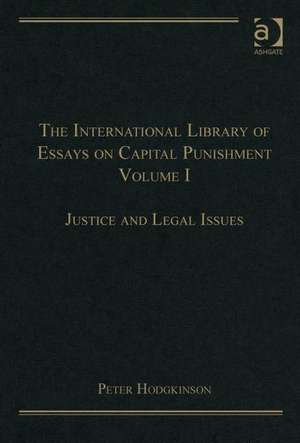The International Library of Essays on Capital Punishment, Volume 1: Justice and Legal Issues: The International Library of Essays on Capital Punishment
Autor Peter Hodgkinsonen Limba Engleză Hardback – 19 dec 2013
Preț: 1695.81 lei
Preț vechi: 2278.54 lei
-26% Nou
Puncte Express: 2544
Preț estimativ în valută:
324.52€ • 336.89$ • 270.61£
324.52€ • 336.89$ • 270.61£
Carte tipărită la comandă
Livrare economică 22 martie-05 aprilie
Preluare comenzi: 021 569.72.76
Specificații
ISBN-13: 9781409461357
ISBN-10: 1409461351
Pagini: 552
Dimensiuni: 169 x 244 mm
Greutate: 1.18 kg
Ediția:Revised.
Editura: Taylor & Francis
Colecția Routledge
Seria The International Library of Essays on Capital Punishment
Locul publicării:Oxford, United Kingdom
ISBN-10: 1409461351
Pagini: 552
Dimensiuni: 169 x 244 mm
Greutate: 1.18 kg
Ediția:Revised.
Editura: Taylor & Francis
Colecția Routledge
Seria The International Library of Essays on Capital Punishment
Locul publicării:Oxford, United Kingdom
Cuprins
Contents: Introduction; Part I Legal Issues: Yong Vui Kong v. Public Prosecutor and the mandatory death penalty for drug offences in Singapore: a dead end for constitutional challenge?, Yvonne McDermott; The limits of international law: efforts to enforce rulings of the International Court of Justice in US death penalty cases, Sandra Babcock; The mandatory death penalty - an international an comparative perspective, Douglas L. Mendes; Fair trial rights and their relation to the death penalty in Africa, Lilian Chenwi; The right to life and the abolition of the death penalty in the Council of Europe, Jon Yorke; The people decide: the effect of the introduction of the quasi-jury system (saiban-in seido) on the death penalty in Japan, Leah Ambler; Waiting to die, dying to live, an account of the death row phenomenon from a legal viewpoint, Caycie D. Bradford; The United Nations and the abolition of the death penalty, William A. Schabas; Life and death in the lawyer’s office: the internship in capital punishment studies, Andy Boon and Peter Hodgkinson; The penalty of life imprisonment under international criminal law, Esther Gumboh; Death penalty mitigation: a challenge for social work education, Joyce G. Reed and Glenn E. Rohrer; The global capital punishment litigation landscape, Kerry Ann Akers. Part II Innocence: The myth of factual innocence, Morris B.Hoffmann; The role of the innocence argument in contemporary death penalty debates, Michael L. Radelet. Part III Race and Religious Discrimination: South Africa: racism and the death penalty, Greg Wallance; Racism, wrongful convictions and the death penalty, Hugo Adam Bedau. Part IV Gender and Sexuality Issues: A nation at war with itself: the potential impact of Uganda’s anti-homosexuality Bill, Barrie Sander; Chivalry is not dead: murder, gender and the death penalty, Steven F. Shatz and Naomi R. Shatz; Zina (adultery) under Islamic law in Nigeria: the gender issues in Amina Lawal’s case, Aminu Adamu Bello. Part V Juveniles: End natural life sentences for juveniles, Jeffrey Fagan; Juvenile parricide offenders sentenced to death, Kathleen M. Heide and Jessica McCurdy. Part VI Victim Issues: Trauma therapy for death row families, Walter C. Long; Contesting the victim card: closure discourse and emotion in death penalty rhetoric, Nancy Berns; Capital punishment: creating more victims?, Peter Hodgkinson, Seema Kandelia and Rupa Reddy; Name index.
Notă biografică
Peter Hodgkinson OBE is Director of the Centre for Capital Punishment Studies and Senior Research Fellow at the University of Westminster, UK.
Descriere
This volume provides up-to-date and nuanced analysis across a wide spectrum of capital punishment issues. The essays move beyond the conventional legal approach and propose fresh perspectives, including a unique critique of the abolition sector. Written by a range of leading experts with diverse geographical, methodological and conceptual approaches, the essays in this volume challenge received wisdom and embrace a holistic understanding of capital punishment based on practical experience and empirical data.


